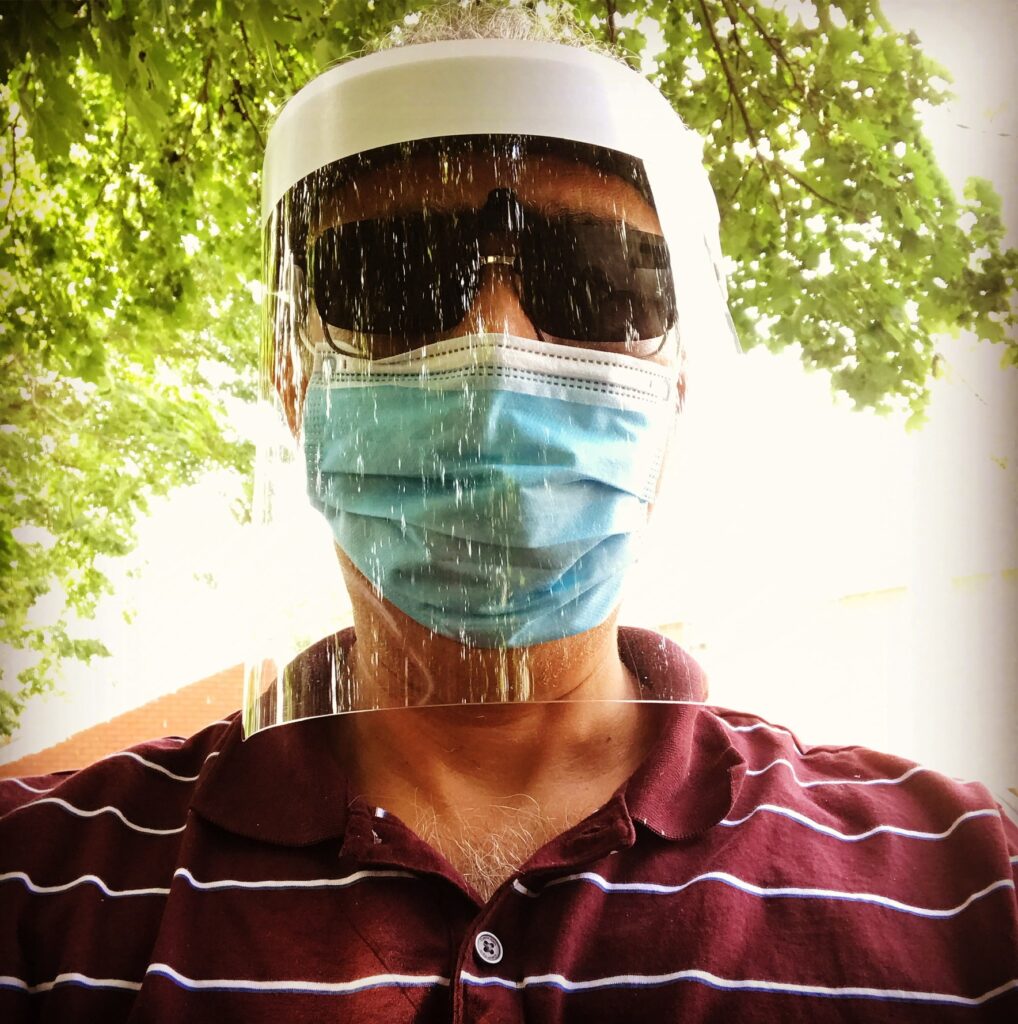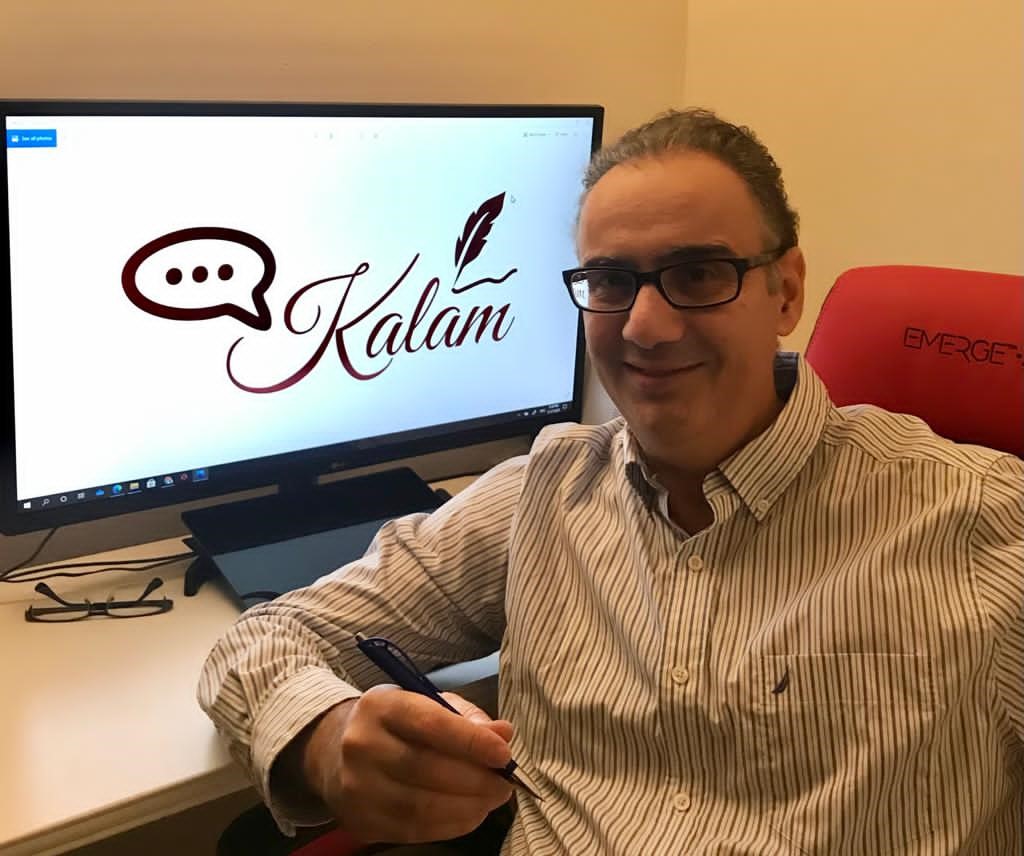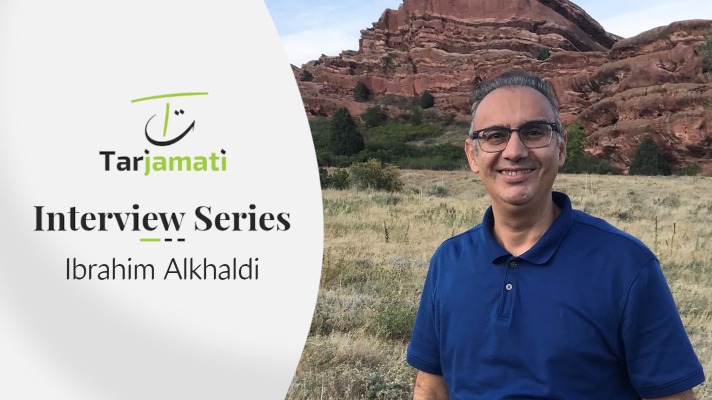This month, I interviewed Ibrahim Alkhaldi, an ATA certified professional English-Arabic translator and certified healthcare interpreter CHI™️ with global background in communications and event management.
Ibrahim was Born in Damascus, a city that served as a hub for rich Arabic language learning for many foreign researchers and scholars who fell in love with its culture. He holds a BA degree in English Literature, Arts and Humanities College. He Lived and worked in many countries, including UAE and Kuwait, and served as the former Regional Manager for Middle East and Africa, the Global Association of the Exhibition Industry, Paris. He now lives in New Jersey, USA, with his wife and two boys.
Ibrahim stands out in my memory as a hardworking professional and, most importantly, a passionate coffee lover 😊 It really didn’t surprise me when he described coffee as “liquid passion!” I met Ibrahim at the 60th American Translators Association conference in beautiful Palm Springs. He is an active member of the ATA’s Arabic Language Division and I’m really delighted to share his thoughts and reflections on translation and interpretation, the challenges that Arabic linguists face, and the possible professional opportunities for Arabic translators. Translators Association.
Happy reading!
Can you tell us more about your background? Where did you grow up and what inspired you to study languages or translation?
First of All, I would like to thank you, dear Shaimaa, for giving me this opportunity to reach out to Tarjamti’s audience everywhere in the world!
Ever since I was a child, as little as an elementary school student, my love for language seemed to pave the way to this exciting career which seemed preordained. At that early stage of life, I tasted the beauty of poetry and figurative language, perhaps earlier than an average kid. Words have always fascinated me, and their magic predominated my academic life. I remember how my Arabic language teacher in high school very often gave me the stage to give the lesson on his behalf. This “literary passion” guided me eventually to choose my major in college without thinking! I preferred English literature to many other fields, such as law, media, or psychology. Fields that were all available for me at the time.
How was the beginning when you embarked on this journey and do you think freelancers face the same challenges when trying to market for their services now?
Well, I started before the internet age! Despite the big differences between now and then in ways of tapping opportunities or showcasing one’s abilities, I can still tell you it has always been hard to find a job or obtain an employment. Translation and interpretation are extremely competitive and ever-changing professions.

Because you are a translator and an interpreter, I’m sure you have developed deep understanding of what each profession requires. Can you tell us how did you professionally maintain equal qualifications for both fields? Which field is the most preferred to you?
To be honest, it won’t be fair to accept your assumption that I maintain “equal” qualifications in translation and interpretation. Theoretically, I don’t believe any linguist would ever be able to. To solve this dilemma, allow me to use the word “balanced” instead. In my humble opinion, a linguist is either a good speaker (interpreter) or a good writer (translator). Obviously, he/she can be good at both, still one of them will have at least a narrow win over the other. It is true that the skills and abilities needed to stand out in each are vastly different, but a talented and hardworking linguist can continuously maintain balanced proficiency to hold a microphone in the morning and work on a CAT tool after lunch break!
Congratulations on your recent ATA certification! This is a significant milestone in any translator’s career. What advice can you give us to sustain our enthusiasm to work more towards certification?
Thank you very much! Obviously, I have every reason to express my happiness. It is such a rewarding feeling to join the elite professional translators’ roster and obtain one of the industry’s most respected and recognized credentials. I was working hard over the last few years to add this prestigious certification to my linguistic professional profile which includes, among others, Certified Healthcare Interpreter (CHI). I am determined to seek more specialized certifications in the future while committing to keeping up with continuous education to maintain current ones.
My message to fellow translators and candidates who are preparing to take this exam: choose your battle wisely, focus, trust yourself, and never give up. I failed in my first attempt and believed that failure is a success in progress. I provided useful insights about the exam in my meeting with the ATA’s Arabic Language Division’s colleagues. You may watch the video on my Facebook page: https://www.facebook.com/kalam.interpretation.translation
What do you think of current learning opportunities available for Arabic translators and interpreters? and what ways do you suggest to increase collaboration among Arabic translators to increase learning resources?
Online learning and training opportunities are abundant, in fact. To me, this is the smallest obstacle nowadays. The major challenge pertains to the Arabic language itself being diglossic. Add to this the absence of a recognized pan-Arab regulatory body that can provide accredited references, specialized dictionaries, glossaries, and other essential resources in an agile, modern way to serve researchers and linguists. Personally, I always feel the difficulty is coming from the Arabic direction of the equation. I don’t want to sound utopianly romantic, but I will always have faith that one day there will be an officially recognized pan-Arab organization that will serve as the reliable reference for the Arabic language. And, who knows, maybe we can think of ourselves as being part of its genesis!
Apart from glowing recommendations from clients, what are the most important interpersonal skills you believe are strongly required in translators and interpreters to be able to cope with COVID-19 and generate more working opportunities?
Go the extra mile! Most clients are suffering too in this pandemic. Helping your clients to get more value of money within your “no loss” area will contribute significantly to boosting trust and opportunities for both parties.

We see more RSI requests are being offered to interpreters due to the health situation. Do you think RSI will prevail, especially when it proved cost-effective for many businesses that hire interpreters?
I guess so. RSI is having its golden days now. Video conferencing grew steadily with a normal pace before COVID19 outbreak. But when the pandemic hit the world, video conferencing skyrocketed and became the alternative solution, substituting onsite interpreting. RSI transformed overnight from being an “option” to become “the solution” to break language barriers in many meetings. On the other hand, when the pandemic retreats, hopefully soon, RSI is not expected to suffer a sudden setback, I guess. It spiked quickly but won’t vanish that easily. Many businesses, as you mentioned, would have changed their meetings style to video-conferencing probably permanently.
What is the most memorable interpretation / translation project that you have worked on?
It was a crazy eleventh-hour project! I remember that summer night when I was asked to translate two VIP speeches of approximately more than 3,500 words each, and have them ready for distribution for an official inauguration ceremony of an international event the following day. For some reason, the organizers received the speeches too late. I was already dog-tired that evening after a long work day, and I had to stay up all night alone in the building, with the security guards checking on me every now and then, and with lots of coffee and little snacks! At 6:30 am, a colleague came to collect the handwritten scripts where a team of typesetters and reviewers completed the job. That night boosted my self-confidence and made me hold on to my faith in teamwork. Many coworkers gave those skeptical looks and said that what the team is about to do is “Mission Impossible.” While those doomwatchers were in deep sleep, the team made things happen!
It is normal to be faced with lack of understanding of the translator/ interpreter role. How do you deal with these setbacks in the profession? and what can be the solution to increase more awareness about the crucial role that language experts play in many industries?
Honestly, not much can be done. Luckily, professionals in many fields know the value and the distinguished role of a qualified translator / interpreter, while individuals looking randomly for a person to translate their documents will most likely understand when they are hit by an amateur or a disastrous text produced by machine translation. Nowadays, where almost every human being has machine translation at their fingertips 24/7, it seems a waste of time to educate people about the importance of professional and qualified linguists unless they ask for it.

Coffee before or during a translation project 😀 ?
Anytime is coffee time. Anytime is teatime. 😊 Coffee is not a drink. Coffee is liquid passion!
Ibrahim Alkhaldi is a dynamic professional with work experience in 40+ countries, including the U.S., China, France, United Arab Emirates. You can contact him through his business Facebook page, Kalam, for translation or interpretation services by visiting this link: https://www.facebook.com/kalam.interpretation.translation


Youssef Mouzahem
Congratulations Ibrahim! Hard work pays off! Way to go my dear friend!